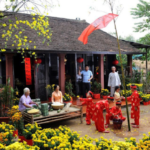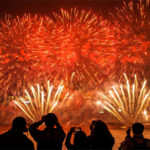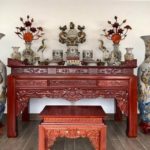The New Year’s Eve ceremony, also known as the New Year’s Eve Exorcism, is a Vietnamese tradition aimed at warding off bad omens and misfortunes of the passing year and ushering in a new year filled with prosperity. This ceremony is usually performed on New Year’s Eve, starting at 11 pm and continuing into the early hours of New Year’s Day.
1. What is the New Year’s Eve Ceremony?
The Significance of the New Year’s Eve Ceremony
The New Year’s Eve ceremony is a significant ritual for Vietnamese families during the Lunar New Year celebration. It is believed that this ceremony, also known as the Exorcism of the Old Year, helps to banish evil spirits and any misfortune or bad luck from the previous year, making way for a happier and more prosperous new year.
As such, the New Year’s Eve ceremony is typically performed at the turning point between the old and new years, marking the transition from the old to the new. This ceremony usually takes place from 11 pm to 1 am on New Year’s Eve, ushering in the Lunar New Year.
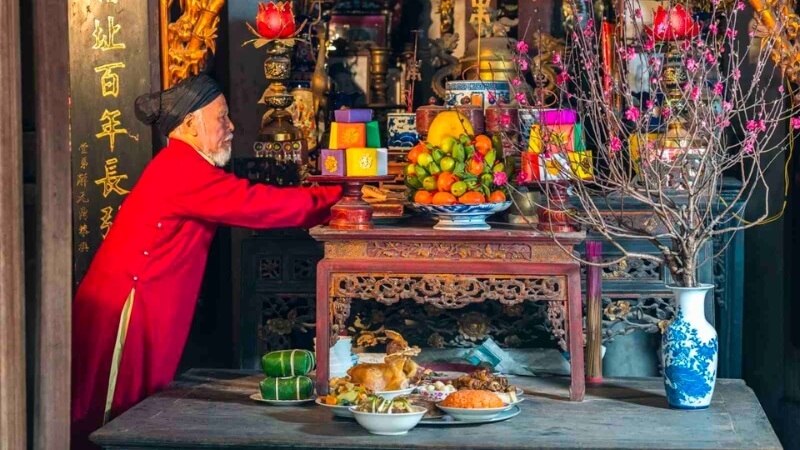 Understanding the New Year’s Eve Ceremony
Understanding the New Year’s Eve Ceremony
Where to Perform the New Year’s Eve Ceremony?
The New Year’s Eve ceremony is conducted in two places: at the family altar dedicated to the ancestors and outdoors. For this ceremony, the family prepares two offerings to express their respect and gratitude to the deities and their ancestors.
2 Location and Timing of the New Year’s Eve Ceremony
Indoor or Outdoor Ceremony?
In Vietnamese culture, it is believed that the Heavenly Court has 12 rulers, each corresponding to one of the 12 zodiac animals, who oversee the affairs of the mortal realm for that particular year. On New Year’s Eve, the duty of overseeing the mortal realm is passed from the current ruler to the next in line.
To show respect to the outgoing ruler and to seek blessings from the incoming one, Vietnamese families always prepare an outdoor offering. It is believed that the outgoing ruler will come across this offering and appreciate the family’s thoughtful gesture. Therefore, on New Year’s Eve, two offerings are prepared: one for the indoor family altar and another for the outdoors.
Timing of the Ceremony for the Year of the Dragon
The New Year’s Eve ceremony is performed at the turning point of the year, marking the transition from the old to the new. Specifically, the ceremony takes place during the hour of the Rat, which falls between 11 pm on the last day of the old year and 1 am on New Year’s Day.
For the upcoming Year of the Dragon in 2024, the ruling deity is the Sovereign of the Ministry of Works, the Fire Star’s Marching God, and the Judge of the Registry.
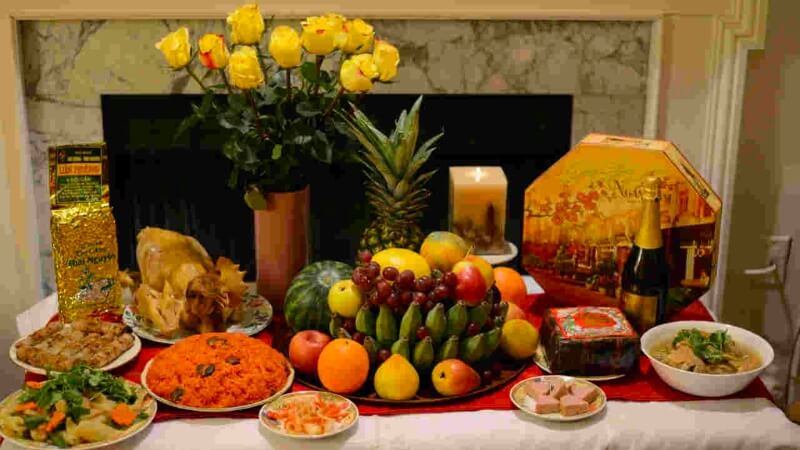 Location and Timing of the New Year’s Eve Ceremony
Location and Timing of the New Year’s Eve Ceremony
3 Offerings for the New Year’s Eve Ceremony (Indoor and Outdoor)
The offerings for the New Year’s Eve ceremony can be either vegetarian or meat-based, depending on the family’s preferences and circumstances. Here are the typical offerings for this ceremony:
- Outdoor Offering: Five types of fruit, flowers, candles, betel and areca nuts, a bowl of salt, a bowl of rice, tea, alcohol, clothing and headwear for the deities, a boiled rooster, sticky rice cakes, steamed glutinous rice cakes, and a boiled pig’s head, along with three large incense sticks.
- Indoor Offering: Similar to the outdoor offering, with additional dishes according to the family’s preferences and circumstances. The clothing and headwear for the deities are not included in the indoor offering.
Nowadays, families tend to simplify the offerings. It is acceptable to prepare only a few of the mentioned items, depending on the family’s tastes and resources.
These offerings should be prepared in advance of the New Year’s Eve ceremony and placed on a table. It is important not to place them on the floor or bring them out only at the time of the ceremony.
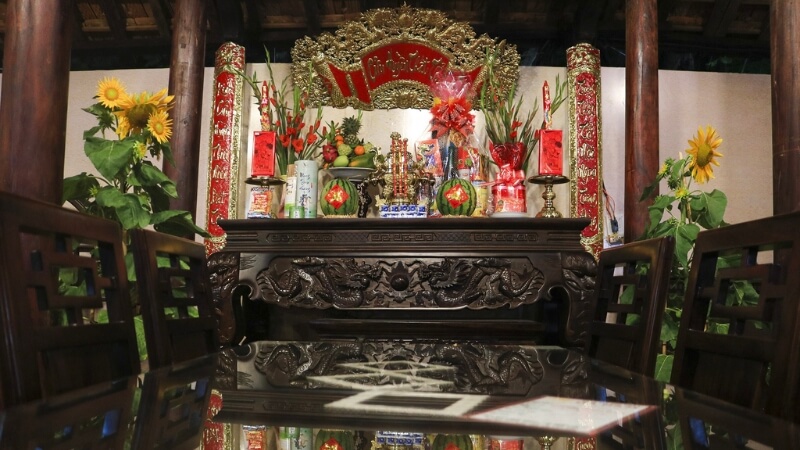 Offerings for the New Year’s Eve Ceremony (Indoor and Outdoor)
Offerings for the New Year’s Eve Ceremony (Indoor and Outdoor)
For more information:
4 Rituals for the New Year’s Eve Ceremony for the Year of the Dragon 2024
Once all the offerings are prepared before midnight, at the stroke of midnight, the head of the family will start the ceremony by rinsing their mouth with fragrant alcohol, lighting the candles and incense, and sincerely reciting the New Year’s Eve prayer.
After completing the prayer, the head of the family will insert the incense sticks into the rice bowl and bow in the four directions and eight orientations to pray for the deities’ blessings and a prosperous new year for the family.
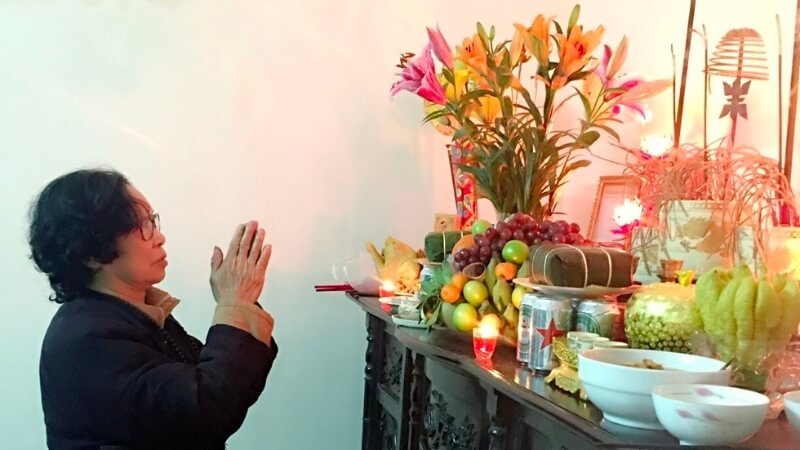 Rituals for the New Year’s Eve Ceremony
Rituals for the New Year’s Eve Ceremony
5 Prayer for the New Year’s Eve Ceremony for the Year of the Dragon 2024
Prayer for the Indoor New Year’s Eve Ceremony
Nam mo A Di Da Phat (Recited three times).
We respectfully bow to: The Future Buddha, Maitreya.
• The Emperor of Heaven and the Gods of the Earth.
• The City God and all the Great Kings.
• The Local Deity of the Earth and the God of the Stove. The Judge of the Registry and all the Gods and Spirits who govern this area.
• Our ancestors and all the departed souls of our family.
As the hour of the New Year approaches in the year …….
We are:………………………………..
Residing at:…………………………………………..
As the New Year approaches, we follow the custom of bidding farewell to the old and welcoming the new. At the stroke of midnight, we offer incense, flowers, and other offerings with sincerity and respect to the Buddha and the Gods. We invite: The City God and all the Great Kings.
The Local Deity of the Earth.
The God of the Stove.
The God of Blessings and Virtue.
The Five Directions and Five Elements Gods, the Dragon Vein Gods of Wealth.
The God of the Family Stove.
The Judge of the Registry and all the Gods and Spirits who govern this area.
Please descend and accept our humble offerings.
We also invite our ancestors: the Patriarchs and Matriarchs, the Uncles and Aunts, Brothers and Sisters, and all the departed souls of our family to descend and enjoy these offerings.
We further invite the spirits of the previous and current owners of this land, as well as the plants and trees, to witness this ceremony and accept our offerings on this New Year’s Eve.
We pray for good health, peace, and prosperity in the coming year. May all our endeavors be blessed with success, and may we be protected from harm. May we find happiness and abundance in all four seasons and receive blessings from both the heavens and the earth.
We offer these sincere prayers, hoping that they will be heard and granted.
Respectfully,
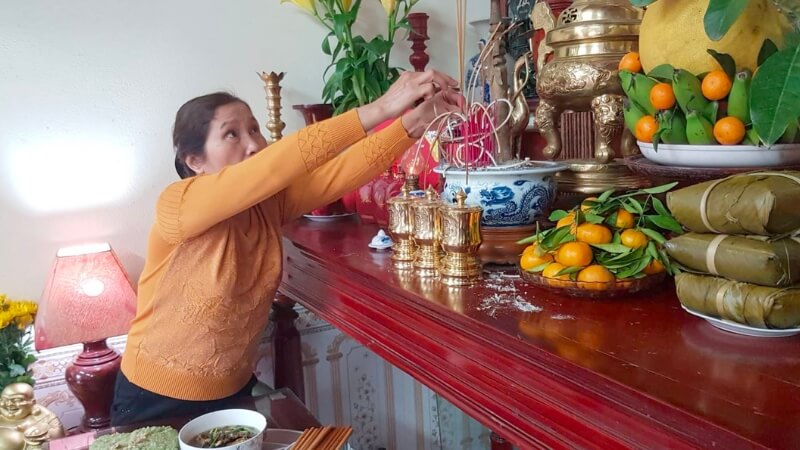 Prayer for the New Year’s Eve Ceremony
Prayer for the New Year’s Eve Ceremony
Prayer for the Outdoor New Year’s Eve Ceremony
Nam mo A-Di-Da Phat (Recited three times)
We respectfully bow to:
The Nine Skies and the Ten Directions of the Buddha, the Buddha of the Ten Directions.
The Future Buddha, Maitreya.
The Bodhisattva Avalokitesvara, who saves suffering beings.
The Emperor of Heaven and the Gods of the Earth.
The Outgoing Year’s Ruler, the Outgoing Marching God, and the Outgoing Judge.
The Incoming Year’s Ruler, the Incoming Marching God, and the Incoming Judge.
The Five Directions, Five Tigers, Dragon Vein, Stove Gods, and all the Gods and Spirits.
As we bid farewell to the Year of the Rabbit and welcome the Year of the Dragon, we offer our sincere prayers.
We are: …, born in: …, under the sign of: …, residing at: …, in the village/ward of: …, in the district/town/city of: …, in the province/city of: …
On this sacred New Year’s Eve, as the old year passes and the new year arrives, we pray for good health and prosperity. We respectfully offer incense, flowers, and other offerings to the Buddha and the Gods, inviting them to descend and accept our humble offerings.
We invite: The Outgoing Year’s Ruler, the Incoming Year’s Ruler, the City God and all the Great Kings, the Local Deity of the Earth, the God of Happiness and Blessings, the God of Blessings and Virtue, the Five Directions, Five Elements, Dragon Vein, and Wealth Gods, the God of the Family Stove, and all the Gods and Spirits who govern this area to descend and accept our offerings.
We pray for good health, peace, and prosperity in the coming year. May our family be blessed with abundance and harmony, and may all our endeavors be blessed with success. May we find happiness and enjoy the blessings of the heavens, the Buddha, and all the Gods and Spirits every day.
With sincerity and respect, we offer these prayers and offerings. May the Nine Skies, Ten Directions of the Buddha, and all the Gods and Spirits bear witness and bestow their blessings upon us.
Nam mo A-Di-Da Phat (Recited three times, bow three times).
For more information:
6 Things to Note for the New Year’s Eve Ceremony
The New Year’s Eve ceremony is an important ritual, and to ensure it is performed correctly, here are a few things to keep in mind:
- The outdoor ceremony should be performed first to bid farewell to the outgoing ruler and welcome the incoming one. Only then should the indoor ceremony be conducted.
- It is important to have both the indoor and outdoor offerings for the New Year’s Eve ceremony.
- Sweet, vegetarian, or meat dishes can be prepared. If meat or vegetarian dishes are offered, they should be placed on a small table below the main altar. The main altar should feature flowers, paper money, sticky rice cakes, and square glutinous rice cakes.
- Avoid placing golden branches and jade leaves on the altar, as they are believed to attract negative energy.
- Do not burn paper money during the New Year’s Eve ceremony, as it is believed to attract wandering spirits.
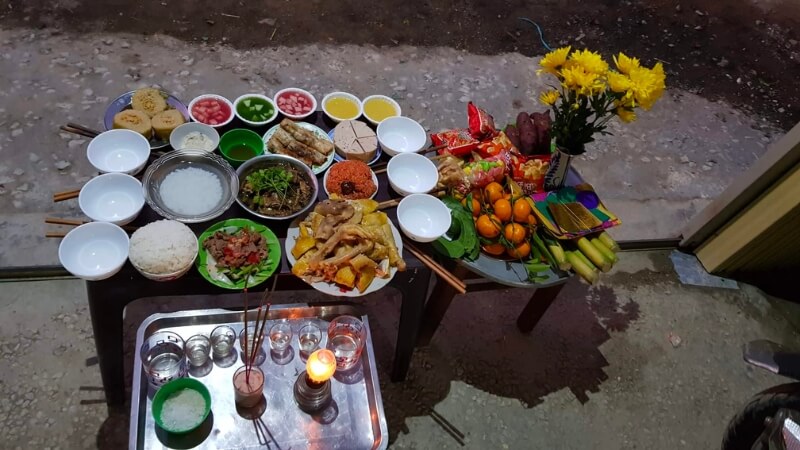 Things to Note for the New Year’s Eve Ceremony
Things to Note for the New Year’s Eve Ceremony
7 Taboos on New Year’s Eve
In addition to the New Year’s Eve ceremony, it is important to be aware of certain taboos to avoid bad luck. Here are some things to avoid on New Year’s Eve according to Vietnamese folk beliefs:
- Avoid saying anything negative or unlucky.
- Do not argue or fight.
- Avoid breaking objects or making loud noises.
- Do not look in the mirror.
- Do not spill oil.
- Do not hang laundry on New Year’s Eve.
- Do not take out the trash.
- Avoid using scissors.
 Taboos on New Year’s Eve
Taboos on New Year’s Eve
This article has provided detailed information about the customs, offerings, and prayers for the New Year’s Eve ceremony for the Year of the Dragon 2024. We hope you found it helpful!
























